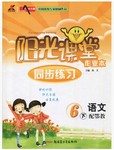题目内容
Only by reading more books improve your reading skills.
| A.you can | B.can you | C.do you | D.you do |
B
解析

 阳光课堂同步练习系列答案
阳光课堂同步练习系列答案Everyone knows about straight-A students. We see them frequently in TV situation comedies and in movies like Revenge(报复)of the Nerds. They get high grades, all right, but only by becoming dull laborers, their noses always stuck in a book. They are not good at social communication and look clumsy(笨拙的) while doing sports.
How, then, do we account for Domenica Roman or Paul Melendres?
Roman is on the tennis team at Fairmont Senior High School. She also sings in the choral group, serves on the student council and is a member of the mathematics society. For two years she has maintained A’s in every subject. Melendres, a freshman at the University of New Mexico, was student-body president at Valley High School in Albuquerque. He played soccer and basketball well, exhibited at the science fair, and meanwhile worked as a reporter on a local television station. Being a speech giver at the graduation ceremony, he achieved straight A’s in his regular classes, plus bonus points for A’s in two college-level courses.
How do super-achievers like Roman and Melendres do it? Brains aren’t the only answer. “Top grades don’t always go to the brightest students,” declares Herbert Walberg, a professor of education at the University of Illinois at Chicago, who has conducted major studies on super-achieving students. “Knowing how to make the most of your innate(天生的)abilities counts for more. Much more.”
In fact, Walberg says, students with high IQ sometimes don’t do as well as classmates with lower IQ. For them, learning comes too easily and they never find out how to get down.
Hard work isn’t the whole story, either. “It’s not how long you sit there with the books open,” said one of the many-A students we interviewed. “It’s what you do while you’re sitting.” Indeed, some of these students actually put in fewer hours of homework time than their lower-scoring classmates.
The kids at the top of the class get there by mastering a few basic techniques that others can readily learn.
【小题1】The underlined word “nerds” can probably be________ .
| A.dull bookworms lacking sports and social skills |
| B.successful top students popular with their peers |
| C.students with certain learning difficulties |
| D.born leaders crazy about social activities |
| A.Most TV programs and films are about straight-A students. |
| B.People have unfavorable impression on straight-A students. |
| C.Everyone knows about straight-A students from TV or films. |
| D.Straight-A students are well admired by people in the society. |
| A.they are born cleverer than others |
| B.they work longer hours at study |
| C.they make full use of their abilities |
| D.they know the shortcut to success |
| A.The interviews with more students. |
| B.The role IQ plays in learning well. |
| C.The techniques to be better learners. |
| D.The achievements top students make. |
| A.IQ is more important than hard work in study. |
| B.The brightest students can never get low grades. |
| C.Top students certainly achieve all-around developments. |
| D.Students with average IQ can become super-achievers. |